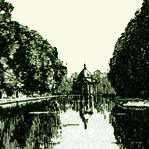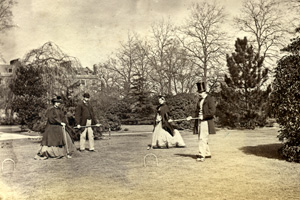
Club
Croquet
Wrest Park

Croquet myths
Croquet is a vicious game
This hardy perennial derives from the way the game was played in private gardens in the mid-
Croquet is posh
The continuing association of the word “posh” with croquet is the fault of the media, who persist in portraying croquet as an English upper-
You keep your foot on the ball when playing the croquet stroke
T his tactic was abolished in 1870. Players may use their foot to position the ball for the croquet stroke to save themselves from having to bend down and position it by hand, but you cannot keep your foot on the ball when you play the stroke. You get another shot after the croquet stroke, so the whole point of the croquet stroke is to move both the balls into better positions so you can continue with your turn.
his tactic was abolished in 1870. Players may use their foot to position the ball for the croquet stroke to save themselves from having to bend down and position it by hand, but you cannot keep your foot on the ball when you play the stroke. You get another shot after the croquet stroke, so the whole point of the croquet stroke is to move both the balls into better positions so you can continue with your turn.
You play in sequence
This is true of golf croquet, but Association croquet did away with this rule in 1920. One of the reasons the myth persists is due to confusion in the public mind between the different versions of the game. Another is that when Association croquet is played on a home lawn and not at a club the players often have to rely on the word of their host or hostess, who may be using old rules inherited from their grandparents.
Garden croquet in the 1860s. Note the size of the hoops and the ball destined for the shrubbery.
© Wrest Park Croquet Club